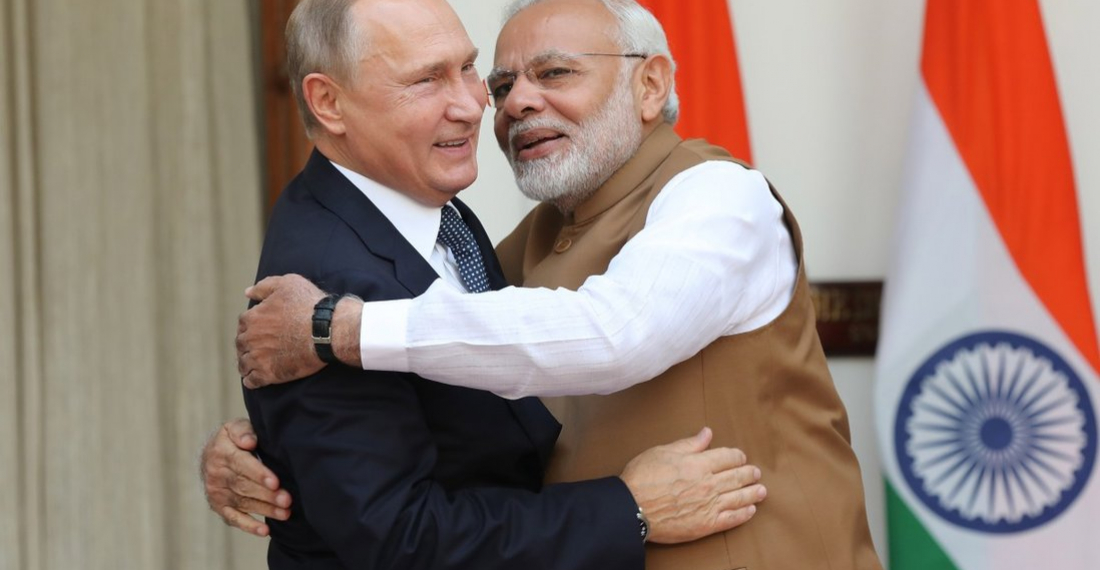Relations between India and Russia have traditionally been very close, and have survived the many ups and downs of global diplomacy. So the news that the traditional annual India-Russia summit will this year not take place, ostensibly because of the coronavirus pandemic, has created intense speculation in both Moscow and New Delhi. Whilst Russian and Indian diplomats have been emphasising that it is business as usual, others are pointing at a new geo-political reality that is straining the relationship.
India-Russia ties are “progressing well,” Russian Ambassador to India Nikolay Kudashev said last week shortly after a statement from the Indian Ministry for External Affairs announcing the cancellation of the summit
“This was a mutually agreed decision between the two governments. Any imputation otherwise is false and misleading. Spreading fake stories on important relationships is particularly irresponsible,” said the Indian Government Official Spokesperson Anurag Srivastava on Wednesday.
Speculation about the real cause of cancellation of this year’s summit began after online news outlet The Print pointed out that the annual leadership summit was not being held for the “first time since 2000,” The observation resonated with recent utterances of Russian Foreign Minister Sergey Lavrov where he had remarked that the U.S. was trying to co-opt India into anti-China policies.
According to the Indian newspaper, The Hindu, Wednesday’s reports were taken up by main opposition Congress Party leader, Rahul Gandhi, who highlighted the cancellation of the annual summit and said, “Damaging our traditional relationships is short-sighted and dangerous for our future.”
The concerns are also being reflected in Moscow, where India's Ambassador has been doing his own damage limitation measures.
India’s Ambassador to Russia, Bala Venkatesh Varma told the Russian newspaper Kommersant, that both parties continue to closely interact in laying the groundwork for a new Russian-Indian summit in the first half of next year. The diplomat rejected suggestions that political tensions could be the reason for cancelling meeting between Indian Prime Minister Narendra Modi and Russian President Vladimir Putin in 2020.
However, Kommersant’s sources in India put the spotlight on some assessments by Russian officials about India's relations with the United States and China that is causing growing confusion in the Indian capital. Indian government spokesman Anurag Srivastava noted that the Indo-Pacific strategy, which has rattled Moscow, is not directed against any particular country.
In its report, Kommersant said that the Indian media reported on the friction between Moscow and Delhi, and opposition leader Rahul Gandhi directly accused the authorities of "destroying traditional ties with Moscow." At the same time, sources told Kommersant that Moscow’s statements about India getting closer to the United States and being drawn into the "anti-Chinese games" are causing increasing bewilderment in Delhi.
Indian international relations specialists are however speculating that the change in the dynamic of Indian-Russian relations is much more deep rooted and reflects a new geo-political reality. Writing earlier this month for the Hindutsan Times, Professor Harsh V Pant assessed the situation thus:
For India, the Indo-Pacific is a strategic imperative — a political geography which is the centre of gravity of global challenges and opportunities. In 2018, Chinese foreign minister Wang Yi dismissed the Indo-Pacific concept as a “headline-grabbing idea” that would “dissipate like sea foam”. As this year draws to a close, from Oceania to western Europe, the idea of the Indo-Pacific is being operationalised in foreign and national security policies of nations, something few had anticipated.
This has been one of the biggest diplomatic defeats for Beijing which had tried so hard to discredit the idea and pressured nations into abandoning it. Instead, India’s commitment towards and a robust defence of a free, open and inclusive Indo-Pacific saw nations underscoring the centrality of this emerging political geography in their foreign policy agenda.
New Delhi has tried to bring Moscow into the Indo-Pacific ambit much like its support for Russia’s Greater Eurasia, without much success. Russia’s resistance to acknowledging this reality is perhaps understandable given its dependence on China but it does no service to either India-Russia ties or to Russia’s role in the wider region where its approach can lead to its marginalisation despite it having some real stakes in the Indo-Pacific. India’s ties with Russia cannot escape the Indo-Pacific.
As India reconfigures its China policy with the Indo-Pacific at its core, India-Russia ties won’t be able to escape this strategic reality.
source: commonspace.eu with Kommersant (Moscow), TASS (Moscow); Hindustan Times (New Delhi) The Hindu (New Delhi) and agencies.
Photo: Indian prime minister Modi hugging Russian president Putin at a previous India-Russia Summit (archive picture)






